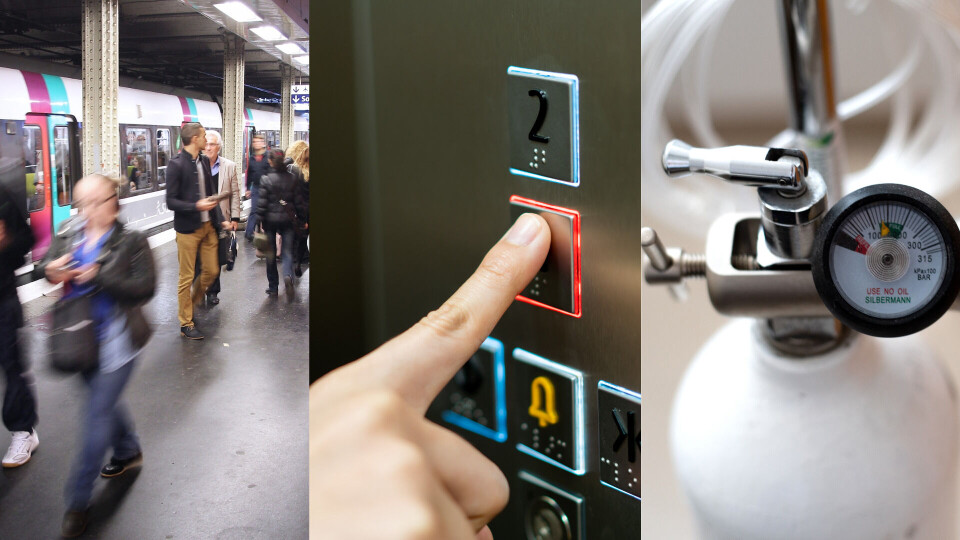-
Map: See how February rainfall compares to average in your French department
More than 30 departments classified as showing ‘extremely high’ levels of rainfall
-
A mayor in France expresses support for British woman expulsed over 'low income'
Briton ordered to leave the country after her small business failed to generate enough income in its first year
-
Pont Neuf in Paris to be transformed into the world’s largest immersive artwork
Visitors will be able to walk through the temporary installation as they cross the Seine
Power cuts in France: what plans for transport, lifts and healthcare?
Contingency plans are being drawn up to prevent, for example, travellers being stuck in trains. People who need at-home medical electricity must register in advance

Transport systems and healthcare providers in France are preparing contingency plans after the government announced the possibility of two-hour power cuts in January.
Any cuts would be organised during peak consumption, from 8:00 to 13:00 and from 18:00 to 20:00 according to a government circular sent to the regional prefects last week. We look at how people would be affected.
Read more: France sets out its strategy for winter power cuts to homes
Read more: Why rural areas in France are expected to be worst hit by power cuts
Trains and metros
Should power cuts happen, some train and tramway circulation could be disrupted but authorities are working to prevent passengers from becoming stuck in carriages during a cut.
Transport Minister Clément Beaune told FranceInfo on Saturday (December 3): “We will not let any train or metro depart if there is a risk of a power cut.”
He said that “suitable and pre-announced” plans would be made for public transport services if the cuts are needed “for obvious reasons of security and to not leave people in a serious situation with a train that is stuck”.
The SNCF rail network (SNCF Réseau) will be in charge of managing the situation and informing operators of the plans. This will mainly concern SNCF Voyageurs but also Trenitalia and freight operators that use the lines.
SNCF said: “In the context of preparations for possible electricity cuts this winter, SNCF Réseau is working with the government and [electricity network] RTE on a national electricity supply strategy for the railway network.”
It said it would issue “more precise information” at a later date.
The plans include identifying sensitive areas of the network to see where electrical power could stop. Major high-tension lines are set to remain on but others could be affected by blackouts.
This could affect major security elements, such as signalling, as well as the lighting on tracks or in stations and subway walkways.
Eurotunnel
Eurotunnel manager Getlink has said that it should not be affected as it can use power from the UK side as well as the French.
Buses, RER, and metro
Electric buses are expected to continue running as their batteries have enough charge to last any two-hour cuts.
In Ile-de-France, RER, RATP, and metro services would be “less severely impacted” as they have their own power supplies. Some services may be disrupted but not as much as trains.
However, electricity cuts could affect escalators and lift functioning. Some teams and RER services are connected to Enedis supplies so transport authority RATP is working with EDF to identify areas that could be most affected, a spokesperson said.
Trams and trolleybuses could be affected outside of Paris, and authorities are meeting this week to establish contingency plans.
Transdev, the company that operates nine tramway networks in France including in Grenoble, Montpellier, and Nantes, said: “Our tramway networks are preparing for the eventuality of partial or total cuts in electricity supply.”
Plans are set to be put in place, namely to reduce the frequency of services, to adapt to the lower electricity output available. Partial services may run, or some services may be cancelled or temporarily replaced by buses.
Transdev is hoping to give customers a three-day warning if any cuts may be taking place.
Keolis, the SNCF offshoot that runs tramways in Bordeaux, Caen, Dijon, and Lyon, said that it was working on similar contingencies. It said, however, that it would be unlikely to confirm any power cuts until 17:00 the night before (the time at which the alert system Ecowatt will also confirm whether or not a cut will take place the next day).
Read more: How to check when electricity usage is under strain in France
Read more: Explainer: What is Ecogaz, France’s new consumption alert tool?
Keolis said that it would not risk making announcements to passengers about cancellations if a power cut had not been 100% confirmed.
However, the company said that its metro system in Lyon, Lille, and Rennes, which it considers of “vital importance”, would not be affected by cuts.
Healthcare and medical equipment
Electricity company Enedis has issued more details on what will happen to people who rely on electrical medical equipment, such as breathing apparatus, for a health condition at home.
It had previously been reported that such patients would be exempted from cuts but it has since emerged that not all of these people will be automatically covered.
Hospitals, police and gendarmerie stations, and other sensitive sites, have already been assured that they will not be affected by cuts.
However, Enedis has said that outpatients who require electrical equipment plugged into the mains “are not on the priority list, as defined by the prefectures” to avoid the cuts.
But the company said that these people will be warned and moved to another location in advance if power cuts are set to take place.
These high-risk patients (officially termed PHRV (patients à haut risque vital)) are defined as those who have “four or fewer hours of autonomy per day. They have to be on a breathing apparatus for at least 20 hours per day”.
The category also includes children who are being fed at home via an intravenous device. This applies to all children or infants who cannot eat or get the nutrients they need orally.
Enedis is working with the Agences Régionales de Santé (ARS), to share a list of PHRVs. Anyone not yet on the list who needs to be must add themselves via this form.
The PHRV list will then be sent to the regional Enedis agency to enable the company to warn affected people in advance so they can prepare. They will be alerted more times than the average person.
Laurent Méric, Enedis spokesperson, told BFMTV: “We are going to call them, send them an SMS, and an email, to make sure they take precautions.”
Everyone else is asked to check the Ecowatt app the evening before.
Related articles
Electricity shortage in France: Will there be power cuts this winter?
























